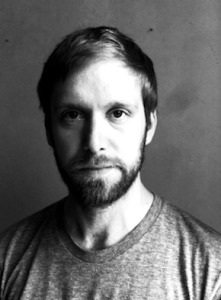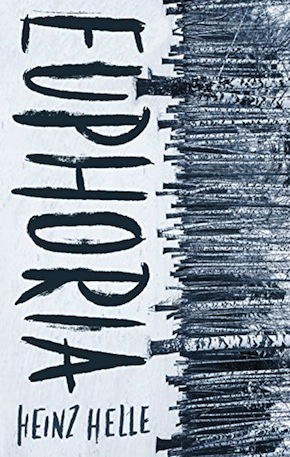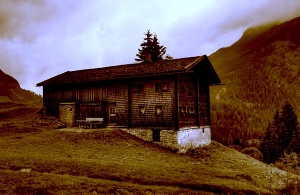Something burned here
by Heinz HelleThe cabin was on a steep slope. It was as remote as it was old. An alpine hut from the eighteenth century. The bathroom had been added at a later date, but the living room was still heated by a wood-burning stove. The snow lay heavy on the pitched roof and on the railing at the edge of the terrace that jutted far out into the void between the slope and the mountain opposite. We rounded the final bend in the road. Huffing and puffing, we approached. We had walked on foot, made the ascent, as they say in the mountains, even though the road wasn’t steep; it was a snow-covered serpentine road, through forests and fields, passable by car only in the summer months. We thought we would probably drink a lot, get drunk that is, definitely, that’s how it is when you get a group of men together, and so it’s not a bad thing if we get a little exercise beforehand. The key was in the shed – a draughty affair full of tools and firewood, old skis and sleds with rusty runners. The wood was piled up to the roof, against the wall, chopped to size, dry and old, waiting to be transformed into ash and smoke. We brushed the snow off our boots and trousers and went inside. Groaning, we deposited the boxes of supplies in the corridor, the backpacks full of beer a little closer to the boiler in the pantry, lest it freeze. We stood there in our thick coats and hats and scarves, stood there in a semicircle around the old stove and waited. We were still warm from the walk up, so at first we didn’t notice how cold it was inside the cabin. Gruber lit the fire immediately. The room took a long time to warm up, but our sweat-soaked bodies quickly grew cold. Bloody freezing, one of us said. Gruber blew on the fire and put another log through the bright square opening. Once it was finally going, he closed the stove door, went into the pantry and switched on the electricity. With the lights on, the room looked warmer already. We put our boots, coats, hats and scarves out in the corridor and then swarmed out, our woolly-socked feet running up the slippery wooden stairs. Men with big backpacks tripping each other up, holding onto each other, jostling each other, swearing, yelling. The beds were assigned, and such and such didn’t want to share with so and so. Later we were sitting at the heavy dining table. In front of us: beer. No one said a word. Outside the window nothing but a gentle, boring grey, and I thought, perhaps a snowdrift would be good, a wall of innumerable tiny reminders of nature’s hostility to life. Of the possibility of closeness between people in a safe place.
…
This place only smells burnt. It’s strange. We’ve never smelt anything like this, and yet we know: there was a fire here.”
Galaxy. The dome looks almost intact, not like a galaxy so much as a UFO, but the fact that this thing with its vaulted roof, the flat-roofed annexes, the car park and the takeaway stands used to be called Galaxy is impossible to miss: the skeletons of gigantic letters jut out from the roof into the surrounding area, visible from far away, charred, but still typographically sound. We don’t know why we’re going there. It seems obvious that if anything there will only be unpleasant things to see, in there, but a nightclub always exerts a strange pull, however rural and big and provincial it may be, and we know now that it isn’t the peculiar and unique combination of smells – liquor, energy drinks, beer, cigarettes, sweat and perfume – that creates that gravitational pull. This place only smells burnt. It’s strange. You know instantly from the smell that something burned here, even though this is not the usual burnt smell. We’ve never smelt anything like this, and yet we know: there was a fire here. The outer walls are intact. No windows on a club like this, of course, so we can’t peer inside. Instead we form an orderly queue, one after the other. Of course we move on after a moment’s hesitation, but the brass stanchions beside us, which were once connected by ropes, the wooden fence behind them, the little window in the heavy steel door – all of this still creates the impression of having to wait to be let in, for someone you don’t know and can’t see to decide that you are ready for the world on the other side of that door. The red carpet is black. The door has been barred from the outside: a bar stool has been wedged into the handles of both double doors. It is bent grotesquely out of shape, and the screws holding the door handles are loose, as if the doors had been pounded repeatedly with something heavy, or by many bodies all pushing together. I can feel the others behind me pushing. We want to get inside, and right now it’s up to me. I can’t open the door. My eyes scan the desolate forecourt. It’s surreally empty, surreally bright, surreally quiet. I picture the two thousand people who would have fitted into this dome, the hard, monotonous beats coming out of the expensive, crystal clear speakers, the carefully carefree dancing of the provincial youth, finding the technical means to make up for their distance from the nearest city, with their subwoofers and their dancing and their fucking. I picture the beautiful bodies of the farmers’ daughters, who stood to inherit the organic farm with an outbuilding for husband and child, and for whom happiness right then was some MDMA and a BMW and unprotected sex on the back seat. I picture the white skin of their faces, quivering in the lacerated beams of the strobe light, their lips and eyebrows pierced, just like their tongues, nipples and belly buttons, and for a split second I expect to see that which a moment later I never could have imagined, never would have thought possible, but am seeing all the same through the tiny window in the door, in the faint light of the cracked dome: hundreds of blackened bodies.
Nothing. Let’s go.
…
That evening we sit huddled together. We don’t make a fire, because we don’t have any paper, but it’s also not that cold, and in any case we’re not really in the mood for fire.
Do you remember when we stole that fire extinguisher from the youth club, says Gruber.
We had been drinking Gorbatschow vodka and orange juice in the car park, and then we got loud and silly and hyped up, and when we saw the huge bouncers and the even huger members of the local biker gang we got quiet and small again.
We came out of hiding and stood in a circle around the barely scratched fire extinguisher, and the excitement we had felt at our audacity quickly evaporated.”
We behaved ourselves and kept our mouths shut and waited for them to check us and give us our stamps. We stood there in the queue with the adorably made-up provincial girls, behind the wooden fences, and the girls had on figure-hugging outfits and their hair pulled back and a bit too much eyeliner. And the bouncers wore bomber jackets and earpieces and that street in Forstinning felt like Sunset Boulevard, and the youth club was the Viper Room, back then. And then we were inside and we rushed to the bar and ordered more screwdrivers, all except for Fürst, he wanted a Coke, he was on antibiotics. And then we’d already run out of money, so we took our half-empty plastic cups out onto the dance floor and stood there, not daring to dance. In front of us the girls, behind us the fire extinguisher. We didn’t notice it until Fürst pushed Drygalski into it. It didn’t hurt, because our coats were heaped on top of it. And he just held on. To the fire extinguisher and the coats. And just for fun, just to show how strong and clever he was, he picked it up, with the coats, and wrapped the coats around it, and then he bent over, holding the fire extinguisher in both arms like a baby, and then he shouted, I’m gonna be sick! I’m gonna be sick! Look out! Get out of the way! And the girls stopped dancing and parted like the Red Sea, then the bouncers, who parted the crowd outside, escorting us, professionally and seriously, out of the club, the one of us with the ball of coats who needed to throw up and his four-man team of chaperones, and we were still shouting, He’s gonna be sick!, long after we’d made it outside, and then we ran into the car park laughing at the stupid bouncers and we ran and laughed and threw the fire extinguisher onto the tarmac, again and again, as hard as we could, from greater and greater heights. Finally Gruber climbed up on the shed for the rubbish bins, and we handed him the heavy metal cylinder, and he held it above his head like Moses with the Ten Commandments, and then the thing made amazingly little noise when it hit the ground, and it didn’t even crack the smooth surface of the car park, and we came out of hiding and stood in a circle around the barely scratched fire extinguisher, and the excitement we had felt at our audacity and the anticipation of the foam quickly evaporated.
Do you remember?
Yes, we remember.
From Euphoria, translated by Kári Driscoll
 Heinz Helle was born in 1978. He studied philosophy in Munich and New York. He has worked as copywriter for advertising agencies, and is a graduate of the Swiss Literature Institute in Biel. Euphoria is published by Serpent’s Tail along with his first novel, Superabundance (2016), also translated by Kári Driscoll. Read more.
Heinz Helle was born in 1978. He studied philosophy in Munich and New York. He has worked as copywriter for advertising agencies, and is a graduate of the Swiss Literature Institute in Biel. Euphoria is published by Serpent’s Tail along with his first novel, Superabundance (2016), also translated by Kári Driscoll. Read more.
Read an extract from Superabundance.
Kári Driscoll was born in Iceland in 1980 and grew up in Iceland, Germany, England and Denmark. After studying German and Italian at Wadham College, Oxford, he completed his PhD in German at Columbia University, New York. He is a lecturer in Comparative Literature at Utrecht University, and has also translated Martin Mosebach’s What Was Before (2014) and Hans Blumenberg’s Lions (2017) for Seagull Books.



